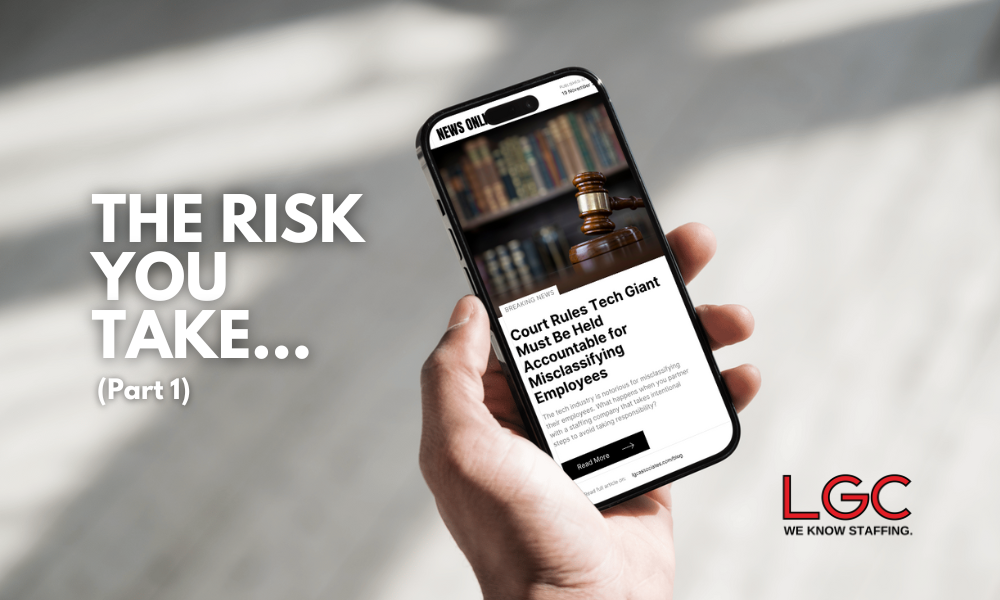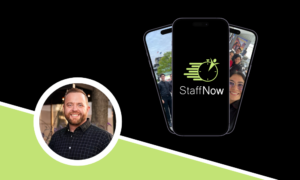How Much You’re Risking By Partnering with Staffing App Technology
If you’ve ever wondered how much risk you’re taking by downloading and using tech for rideshare, food delivery, or even staffing, the answer is likely more than you realize. When it comes to app technology, the phrase “buyer beware”—or caveat emptor—is especially relevant.
The tech industry has faced numerous lawsuits involving damages, personal injuries, and even wrongful deaths, many of which have been dismissed, ignored, or are still ongoing cases years later. How do these companies avoid responsibility when things go wrong? Let’s explore how companies deflect responsibility, leaving their clients on the hook.
How Companies Sidestep Responsibility: A General Case Study
How much responsibility should companies assume when things go wrong? Most companies argue they cannot be held liable since they merely act as platforms with no control over user actions. While there’s some truth to this, the risks associated with these services have created an urgency for users to demand accountability.
We’ve all heard disturbing stories of rideshare drivers committing crimes or causing accidents while distracted by notifications. Despite numerous lawsuits, users and families face significant challenges in proving their cases. If people come forward with issues, why is it so difficult to prove the company was negligent?
One of these reasons is due to requiring all users and workers to sign arbitration agreements. While arbitration agreements are not inherently an issue, they can become barriers for accountability related to certain claims and class action lawsuits.
Another way companies frequently deflect liability is by asserting their workers are independent contractors. In a notable case, a driver caused an accident leading to a man’s leg amputation. As the worker was an independent contractor, the company claimed they were not liable.
This response is not unique to automobile accidents either. One of the most common claims in rideshare is sexual misconduct and assault, yet few cases have proved negligence. Even when investigations occur, little changes. A former employee revealed that a third of cases investigated involved sexual misconduct, and companies often fail to share critical data with law enforcement or background check firms, allowing problematic individuals to remain active.
When questioned in courts, companies claim they are not liable for any negative outcomes of their platforms, often citing Section 230 of the Communications Decency Act (CDA). While even The U.S. Department of Justice has revisited the scope of this section of the CDA and offered that maybe it no longer aligns with the realities of modern internet, it is still regularly brought up in similar cases. Evading liability on so many different accounts begs the question: ‘Who is responsible?” Well, look no further than the liabilities and disclaimers section of a terms and conditions agreement for answers.
To illustrate, here is an excerpt from a sample company’s terms agreement.
“[Company Name] makes no guarantee of reliability, timeliness, quality, or availability of services and is not liable for indirect, incidental, or consequential damages, including personal injury or death, regardless of negligence.”
Therefore, legal liability may be absolved. These sections can be debated with an arbitrator and later in court if they’re deemed unjust, but generally they stand to challenge.
Unfortunately, these issues are not specific to the rideshare and food delivery industries. Our main focus lies in how the staffing industry has grown to include tech platforms, and therefore debate levels of responsibility in a similar manner. Let’s delve deeper into the relationship between staffing companies and their clients.
Taking Responsibility in the Staffing Industry
Though the means by which workers compensation or liability claims arise in the staffing industry differ from the situations mentioned above, the request for workers compensation remains the same. The central issue in our industry revolves around worker classification, as this determines whether or not a worker is entitled to workers compensation, overtime pay, and other employee benefits.
With current legislature cracking down on misclassification, companies who get caught will be subject to significant fines and blows to their credibility. And clients who are unknowingly co-employers of misclassified workers will be responsible for things like paying back wages or workers’ comp claims alongside the company who staffed the misclassified worker.
Our clients however, don’t fall into this trap because StaffNow by LGC classifies all app workers as employees. Because StaffNow and LGC are inherently intertwined, we take responsibility for everything that pertains to our employees and our business, even with gig employees. Don’t believe us? Let’s go behind the scenes to see how StaffNow protects its clients.
Terms & Conditions
Our concise two-page terms set us apart from other companies with lengthy agreements. We prioritize clarity and relationship-building with our clients. As such, we clearly state that our workers are employees, relieving our clients of responsibilities related to pay, workers’ compensation, or tax issues.
Where other companies warn users and partners that usage of their services are “at your own risk,” including the knowledge that in doing so you subject yourself to potential dangers, injury, and dissatisfaction, at LGC we take a more relational approach.
Instead of relieving ourselves of any blame in regards to the “reliability, timeliness, quality, suitability, or availability” of our gig employees, if a staffing placement is not on par with your expectations we will work with you to find a solution that exceeds your expectations.
What sets our services apart is that all LGC workers, those who are placed solely through StaffNow included, are classified as LGC employees. Since LGC is their sole employer, we take care of everything from workers compensation claims, to weekly payroll, tax deductions, overtime pay, and more. The only thing we ask of you, our clients, is to supervise our workers while they’re on the job and provide them with a safe working environment.
So, how much are you risking when entering into an agreement with LGC? The good news is it’s not much. The only caveat we have outlined is that the “means, manner, and methods” in which a worker completes their duty is your responsibility as the client. We feel that this is a reasonable request and as such, it allows us to enter into a true partnership.
We’re proud of our procedures and the lengths we will go to protect our clients and employees. Why do we do this? It’s the LGC way.
There are no hidden agreements or unreasonable limitations of our liability that you have to worry about, we promise. If there’s ever an issue, we want to fix it for you. What makes StaffNow different is that it’s not an independent extension of our business, rather it’s an integral part of our current model that supplements our mission.
It’s not run by bots, we’re still the real people behind the screen. This is why we can’t side-step responsibility – because that would go against everything we stand for. As a leading W-2 employer in the hospitality staffing industry, we aim to keep our employees and clients free from unnecessary legal complications.
If you’re looking for a trustworthy staffing platform, StaffNow guarantees a reliable partnership, supporting you every step of the way. At LGC, we know staffing and we also know people. Reach out to us today and we’ll do what we do best.
*Links in this article are provided solely for informational purposes and reference. LGC does not own or operate any of the linked websites, nor is responsible for any of the content represented on those sites.*
───────────
Want to learn more?
Stay connected with us by following our social media! You can also download our app, StaffNow today!
About LGC
Since 2003 LGC has been building connections between businesses with staffing needs and job seekers looking for new opportunities. Our range of solutions includes temporary and permanent placements (and everything in between) for a variety of industries. With offices located nationwide, we can tap into a dynamic pool of talented professionals. We have a passion for creating partnerships that last and work hard every day to ensure both clients and candidates reach their employment goals.




